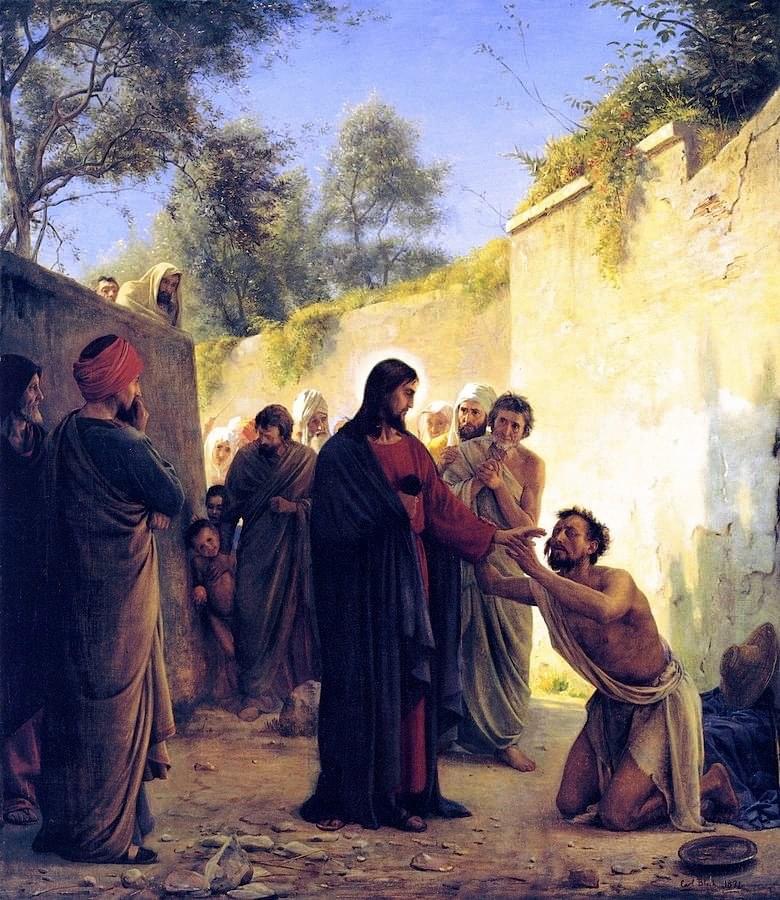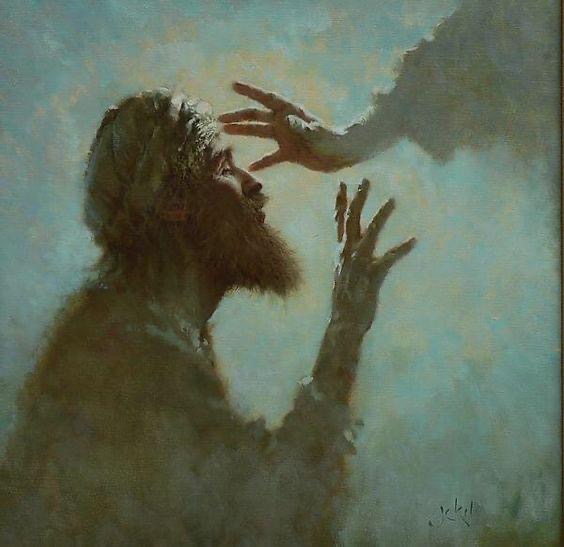Αγαπητά εν Χριστώ αδέλφια,
Ο Ιησούς είχε στρέψει το πρόσωπό Του προς την Ιερουσαλήμ όταν πέρασε τελευταία φορά από την Ιεριχώ. Μπήκε μέσα με τους μαθητές Του και βγήκε πάλι έξω, αλλά όχι χωρίς να αφήσει ένα χαρακτηριστικό σημάδι. Ο Βαρτιμαίος, ο τυφλός ζητιάνος, γιος του Τιμαίου, καθόταν στην άκρη του δρόμου, ζητιανεύοντας, περιμένοντας όπως έκανε κάθε μέρα να περάσουν ευεργέτες και να του δώσουν μερικά νομίσματα για να ικανοποιήσει τις ανάγκες του!
Ο Βαρτιμαίος άκουσε θορύβους και φωνές που δεν είχε συνηθίσει να ακούει κάθε μέρα, και ίσως ρώτησε κάποιον από τους περαστικούς την ταυτότητα των ανθρώπων που τον πλησίαζαν, και η απάντηση ήταν ένας πειρασμός: Είναι ο Ιησούς από τη Ναζαρέτ με ένα πλήθος ανθρώπων που περνούσε από εκεί.
Πρέπει να πούμε εδώ ότι ένας ζητιάνος γνωστός στην πόλη του ως γιος του Τίμαιου, είχε «τα αυτιά του» για να ακούει τι γινόταν μέσα στην πόλη, ενώ αυτός ήταν έξω! Είχε ακούσει για τον Ιησού, τον προφήτη, Υιό του Δαβίδ που δίδασκε τη φιλανθρωπία και έκανε το καλό. Ίσως η ελπίδα να είχε καταβάλει το μυαλό του, γιατί ο πρώτος στόχος του ζητιάνου ήταν τα χρήματα και σήμερα ήταν η μέρα που ήλπιζε να τα αποκομίσει άφθονα, γιατί αυτός που περνάει αγαπάει τους φτωχούς και όσοι είναι μαζί Του επηρεάζονται από τη διδασκαλία Του, οπότε θα απολάμβανε τον ήχο του χαλκού και του ασημιού και θα επικεντρωνόταν στο μέτρημα και την επόμενη φορά θα τον σταματούσε και θα του ζητούσε να δει.
Σηκώθηκε όρθιος και φώναξε: «Ιησού, Υιέ του Δαβίδ, ελέησέ με!», αλλά εδώ ήταν η απελπισία, αντί να βοηθηθεί από εκείνους που περπατούσαν με τον Ιησού, τον επέπληξαν επειδή σιωπούσε! Αλλά αυτό ήταν ένα σημείο καμπής στη ζωή του, χωρίς καμία ελπίδα για τους ανθρώπους! Φώναξε ακόμα πιο δυνατά: «Γιε του Δαβίδ, ελέησέ με!». Και ο Ιησούς περίμενε αυτή τη δεύτερη κραυγή, που προερχόταν από την απελπισία μιας καρδιάς πληγωμένης από τη σκληρότητα των ανθρώπινων καρδιών, σταμάτησε και τον φώναξε.
Το πλήθος του είπε: «Θάρρος! Σήκω πάνω! Σε φωνάζει», οπότε έριξε τον μανδύα του, σηκώθηκε και τον πλησίασε. Όταν άκουσε τη φωνή του Ιησού, εγκατέλειψε ό,τι του ανήκε, εγκατέλειψε ό,τι τον προστάτευε από τη ζέστη της ημέρας και το κρύο της νύχτας, και έστρεψε τα σκοτεινά του μάτια σε έναν και μόνο στόχο: να τον συναντήσει πρόσωπο με πρόσωπο, έστω κι αν δεν μπορούσε να τον δει με τα θαμπά του μάτια, αλλά η δόξα του Θεού δεν κρύβεται από τα μάτια της συντετριμμένης καρδιάς. Ο λόγος του Θεού λέει: «Οι θυσίες που είναι ευάρεστες στον Θεό είναι το συντετριμμένο πνεύμα: Θεέ μου, δεν καταφρονείς τη συντετριμμένη καρδιά». (Ψαλμ. 51: 17).
Στάθηκε μπροστά του και ο Ιησούς τον ρώτησε: «Τι θέλεις να σου κάνω;», και ίσως αυτή να ήταν η πιο δύσκολη ερώτηση της ζωής του. Πέρασαν δευτερόλεπτα κατά τη διάρκεια των οποίων όλη του η ζωή πέρασε από το μυαλό του για να βρει την απάντηση: «Κύριε, ας ξαναδώ!». Και η θεραπευτική απάντηση του Ιησού ήταν: «Πήγαινε, η πίστη σου σε έσωσε». Τότε άνοιξαν τα μάτια του και μπροστά του στάθηκε το λαμπρό πρόσωπο του Θεού, και ήταν ίσως μια από τις πιο όμορφες στιγμές της ζωής του, η πρώτη εικόνα που είχε μετά την τύφλωσή του ήταν το στοργικό πρόσωπο του Θεού.
Είναι αλήθεια ότι ο γιος του Τίμαιου δεν είχε την όραση, αλλά είχε διορατική εσωτερική όραση. Έκανε καλά που δεν ενέδωσε στον πειρασμό του ήχου των νομισμάτων και δεν ανέβαλε τη συνάντησή του με τον Ιησού, γιατί το πέρασμα του Ιησού από την Ιεριχώ ήταν το τελευταίο πριν από την Ιερουσαλήμ και τον σταυρό, και επρόκειτο να χάσει τη συνάντησή του με τον Θεό.
Σήμερα, εμείς που έχουμε απογοητευτεί από τον κόσμο, πρέπει να συγκεντρώσουμε την ουσία της ζωής μας και να σταθούμε μπροστά στον Ιησού που μας ρωτά για το τι επιθυμούμε στην ζωή, ώστε η απάντησή μας να είναι σαν αυτή του τυφλού: «Θέλω να δω!». Το δικό Σου φως, Κύριε! Θέλω να ανοίξουν τα μάτια μου μετά την πνευματική τύφλωση που με κατατρώει σε αυτόν τον ξεπεσμένο κόσμο, ώστε να μπορώ να κοιτάξω στα μάτια σου και να βυθιστώ στην αγάπη σου που σε οδήγησε να δοθείς για μένα στον Σταυρό.
Σήμερα, έχουμε μεγάλη ανάγκη να κατανοήσουμε την αξία της συνάντησης με τον Χριστό, να εγκαταλείψουμε όλα όσα μας δεσμεύουν σε αυτόν τον εφήμερο κόσμο, όπως έκανε ο Βαρτίμαιος για να σταθεί μπροστά στον Ιησού.
Ο προφήτης Ησαΐας μας λέει: «Δώσε προσοχή και έλα σε μένα- άκουσε, και η ψυχή σου θα ζήσει» (Ησαΐας 55:3). Και ο συγγραφέας της επιστολής προς Εβραίους αναφέρει τα λόγια του προφήτη Δαβίδ στον Ψαλμό 95: «Σήμερα, αν ακούσετε τη φωνή Του, μην σκληρύνετε τις καρδιές σας». (Προς Εβραίους 4:7). Αμήν.
+ Σελίμ Σφέιρ
Αρχιεπίσκοπος Μαρωνιτών Κύπρου


